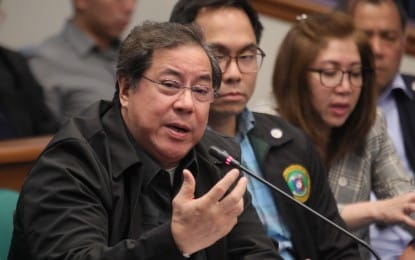

Health Secretary Teodoro Herbosa (PNA file photo by Avito Dalan)
MANILA, Philippines – The Philippine Health Insurance Corp. (PhilHealth) does not provide pension insurance to its members, Department of Health (DOH) Secretary Teodoro Herbosa said Friday.
Herbosa, who also chairs the PhilHealth Board of Directors, noted that health insurance and pension serve distinct purposes and provide financial protection in different ways.
READ MORE:
Escudero: PhilHealth’s zero budget is ‘because of their own failure’
Marcos: No reduction of PhilHealth benefits
PhilHealth designs packages for kids’ eyeglasses, emergency care
“I have been reading comments about the PhilHealth issue. It seems many do not understand the difference between pension and health insurance,” he said in a statement.
Pension insurance provides a steady income stream after retirement, ensuring financial stability and security during old age.
It is typically offered by employers or purchased individually. Contributions are made during working years and after retirement, benefits are paid out as a monthly annuity and often include survivor benefits and lump-sum payments.
Meanwhile, health insurance covers medical expenses, hospitalization, and other health care-related costs, protecting against financial strain due to illness or injury.
It may offer additional benefits, such as dental, vision, and wellness programs. Premiums are paid monthly or annually, and benefits are paid when medical services are used.
In terms of eligibility and enrollment, pension insurance is often tied to employment or age while health insurance is generally available to persons, families, or employees through group plans.
Pension insurance benefits are typically based on salary, years of service, or contributions while health Insurance benefits are determined by policy terms, coverage limits, and out-of-pocket expenses.
Pension insurance contributions may be tax-deductible and benefits are taxed as income. On the other hand, health insurance premiums may be tax-deductible and benefits are generally tax-free.
In the Philippines, the Social Security System and Government Service Insurance System offer pension insurance, while health insurance is provided by PhilHealth and private insurers.
Herbosa said the PhilHealth management, which is distinct from the Board, has treated the state insurer’s funds like a pension fund.
“That’s why their emphasis has been to protect the fund and resist paying the health benefits of its members. We need to fix this broken system,” he added.
PhilHealth was not given a government subsidy for its indirect contributors for next year.
The PhilHealth Board approved the PHP284 billion corporate operating budget (COB) for Fiscal Year 2025.
The COB takes into account the zero-government premium subsidy for indirect contributors and includes the computations of the management’s PHP150 billion surplus budget as of Oct. 31. (PNA)
Read Next
Disclaimer: The comments uploaded on this site do not necessarily represent or reflect the views of management and owner of Cebudailynews. We reserve the right to exclude comments that we deem to be inconsistent with our editorial standards.

